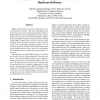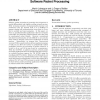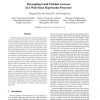127 search results - page 6 / 26 » Evaluating Hardware Support for Reference Counting Using Sof... |
121
click to vote
ASPLOS
1992
ACM
15 years 6 months ago
1992
ACM
The foremost goal of superscalar processor design is to increase performance through the exploitation of instruction-level parallelism (ILP). Previous studies have shown that spec...
122
click to vote
ERSA
2008
15 years 3 months ago
2008
This paper presents an accelerator for k-th nearest neighbor thinning, a run time intensive algorithmic kernel used in recent multi-objective optimizers. We discuss the thinning al...
114
click to vote
ACSAC
2003
IEEE
15 years 6 months ago
2003
IEEE
Buffer overflow attacks have been causing serious security problems for decades. With more embedded systems networked, it becomes an important research problem to defend embedded ...
110
click to vote
ANCS
2010
ACM
15 years 12 days ago
2010
ACM
Software packet processing is becoming more important to enable differentiated and rapidly-evolving network services. With increasing numbers of programmable processor and acceler...
113
click to vote
ISCA
1999
IEEE
15 years 6 months ago
1999
IEEE
Providing adequate data bandwidth is extremely important for a wide-issue superscalar processor to achieve its full performance potential. Adding a large number of ports to a data...



